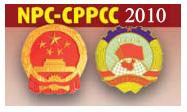top
Building Chinese culture
By Mu Qian (China Daily)
Updated: 2010-02-27 08:59
 |
Large Medium Small |
World influence includes critical as well as commercial success

For Zhang Yu, general manager of China Arts and Entertainment Group, the gap between China's and the United States' use of soft power is clearly reflected in the film Avatar.
While the American film easily sweeps the box offices throughout China, no Chinese film comes close to its appeal at home or abroad.
"We have achieved great economic success in the last 30 years, but culturally we are lagging far behind," he said.
Zhang believes that China is now catching up in terms of cultural influence. At least, his group is now developing at an unprecedented rate.
Last month, the group was granted credit not exceeding 1 billion yuan ($147 million) by the Industrial and Commercial Bank of China. According to Zhang, the cash will be used to promote the company's productions in overseas markets, build its national ticketing system and performance venues.
"Our aim is to become a major arts and entertainment group, like Walt Disney or Time Warner," he said.
Era, a multi-media show which the group co-produced with the Shanghai Media Group, has attracted more than 1.7 million viewers since 2005. Zhang is now planning to take the show on tour overseas and hopes it will have the influence of Mamma Mia, a recent Hollywood blockbuster musical.
However, in the eyes of Feng Jicai, vice-president of the China Federation of Literature and Art as well as a renowned writer, painter and preservationist, commercialization is not always helpful in building China's cultural influence.
"Prices for Chinese art works have been rising greatly, but we have not seen the birth of masterpieces that represent our time. Chinese films have achieved marvelous box office appeal, but not critical, artistic success," he said. "Cultural undertaking is not just about business."
Feng, who believes there are some forms of culture and art that are not commercially viable and need to be supported by the government, established the Feng Jicai Folk Culture Foundation, which is devoted to the preservation of traditional Chinese culture. Apart from the sale of his own paintings, the foundation has yet to receive much in the way of public donations.
"Chinese society is now like an upstart. Most people in the cultural field are only thinking of making money through culture," he said.
Feng, who is a standing member of the National Committee of Chinese People's Political Consultative Conference (CPPCC), is going to submit a proposal at this year's CPPCC about the establishment of a system for re-evaluating the preservation of intangible cultural heritage and penalizing those responsible for its vicious exploitation.
"Culture is something that must not be missing. I hope the government will set up a forward-looking national strategy that will upgrade China's cultural development," he said.












